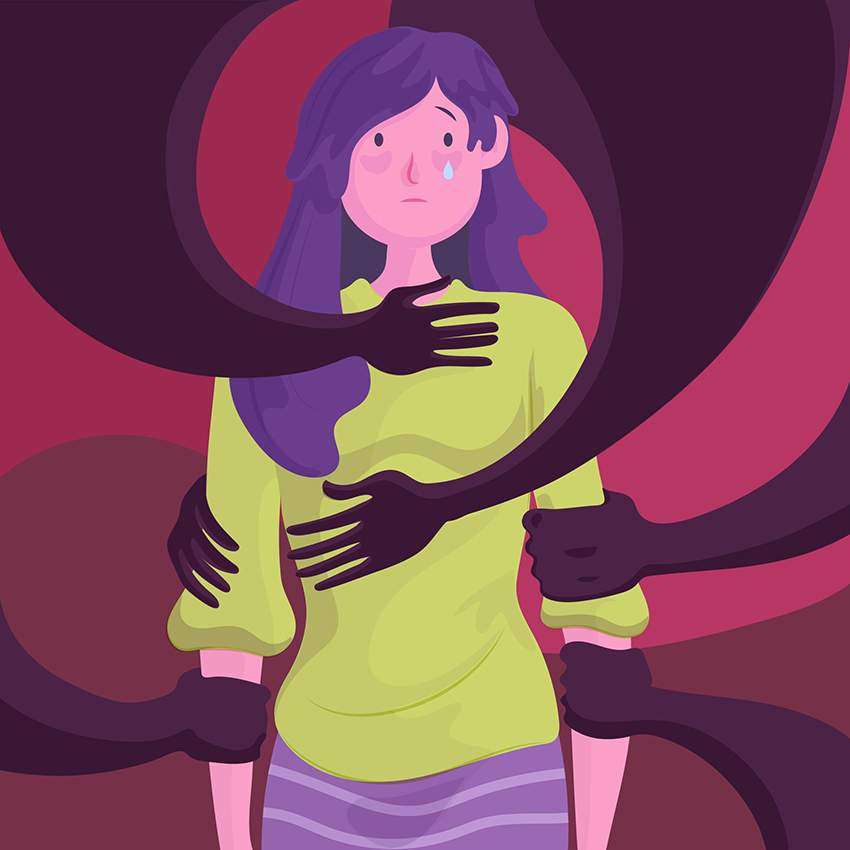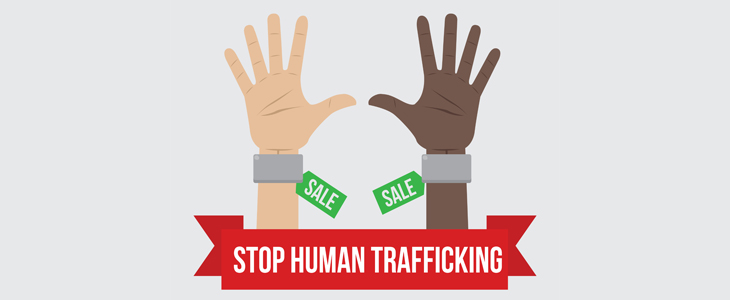Content Warning: This article contains material that some readers may find harmful or upsetting.
One huge, complex and wicked problem besieging our world today, along with poverty, racism, and discrimination, is sex trafficking. Sex trafficking can also be known as forced prostitution or sexual coercion and is the exploitation of basic human rights. However, it is not a subject that receives much light.

Source: Freepik.
Sex Trafficking and The Exploitation of Human Rights
What It Isn’t
First of all, let’s get something straight. Being a victim of sex trafficking has nothing to do with being a prostitute. The definitions are very different. Perpetrators may often label a victim of human trafficking as a prostitute in order to ease their own minds. In fact, a prostitute exchanges sex for money because she wants to. However, a victim of sex trafficking is forced into prostitution.
What It Is
Sex trafficking and the exploitation of human rights happen more often than people realise. Furthermore, it falls under the scope of human trafficking. In fact, these are some of the key aspects of sex trafficking and other types of exploitation:
- Above all, there is the physical movement of people across and within borders using deception, force, or coercion.
- Sex trafficking and exploitation of rights occur throughout all nations, whether developed or developing. Indeed, there is much more trafficking in developed nations than was once thought.
- Criminals can be both upper and lower-class members of society. In fact, trusted members of government and pillars of society can be guilty.
- Sex traffickers can work as individuals, groups, gangs, or even entire communities.
- Traffickers use threat, fraud, deception, abduction, coercion, and manipulation (such as Neural Linguistic Programming) on their victims.
- All races, ages, and genders are at risk of having their rights exploited. Often, perpetrators lure victims through false promises of rewards, money, gifts, or love. Sometimes, the perpetrators promise to restore victims to their children and families.
- Sex trafficking and exploitation of rights can take place in various locations, such as brothels, on the streets, or even within a victim’s own home. In fact, some perpetrators will constantly monitor and exploit victims, recording and livestreaming their assaults.
The Prevalence Of Sex Trafficking And Exploitation Of Rights
Human trafficking is a major crime in the world and a significant violation of human rights. In fact, traffickers around the world exploit men, women, and children through servitude, slavery, forced labour, forced marriage, debt bondage, forced prostitution, and organ harvesting. In fact, the criminals are not only the men and women exploiting their victims but also the clients, who are engaging in the act of rape.
How does sex trafficking and the exploitation of rights affect the Victim?
Victims of human trafficking suffer severe consequences, including physical and emotional trauma, loss of freedom, exploitation, and often enduring long-term psychological and social challenges. Also, they may face health issues, experience violence and abuse, and endure a profound loss of dignity and self-esteem. Additionally, victims often struggle to reintegrate into society and face difficulties in building stable relationships and finding employment, perpetuating the cycle of vulnerability and marginalisation.

Source: United Nations.
Who is most at risk of sex trafficking and Having their rights exploited?
Human trafficking is not only the exploitation of a person’s rights but also their vulnerability. In fact, anyone can be a victim of sex trafficking, but listed below are the most vulnerable sections of the society who are prone to human trafficking:
- Runaway and homeless youth: A trafficker may approach them at transportation hubs/shelters or public areas. Moreover, traffickers use role play and by using feigned affection or manipulation to elicit sex or service from victims. Perpetrators may compel these victims to provide services in exchange for food and other basic amenities.
- Individuals with disabilities: People requiring special needs are very vulnerable to trafficking.
- Foster Youth: This happens when there is instability in the welfare system. Indeed, this instability creates opportunities for traffickers to reach out and bond with children who are vulnerable. They then use this relationship to initiate sexual activity and force prostitution.
- LGBTQ+: This community has been a target of human trafficking due to a lack of support from family or friends, discrimination, and high rates of abuse. Also, transgender and other gender non-conforming individuals have issues receiving access to shelters separated by binary gender, making them even more vulnerable to exploitation.
- Undocumented migrants: People trafficked from Asian countries like the Philippines, Korea, and Thailand, as well as other developing nations, typically end up in developed countries such as the United States or Australia. Furthermore, victims work as domestic servants on farms or in restaurants. Perpetrators control the victims through debt and blackmail.
Signs Of Sex Trafficking and exploitation of rights:
- Frequent relocations.
- Isolation.
- Controlled communication.
- Physical abuse.
- Unexplained wealth.
- Poor health.
- Fear and anxiety.
- Controlled movement.
- Constant surveillance.
- Inability to speak freely.
- Lack of personal items.
- Inconsistent stories.
- Tattoos or branding.
- Substance abuse.
- Fear of law enforcement.
How Can You Help?
Indeed, sex trafficking and rights exploitation is still a major issue across the world. In fact, though there are laws that prohibit it, there’s always a loophole that human traffickers workaround to their advantage.
There are, however, many ways to combat sex trafficking. Refuse to participate in or cover-up up the crime any further. In fact, even if you are a silent observer and remain silent while witnessing this horrendous crime, you are aiding and abetting the criminals. Victims of human rights exploitation need real support in rebuilding their lives and reconnecting them with estranged loved ones.
Here are some ways that you can support those who have been victims of sex trafficking:
- Raise awareness through advocacy and education.
- Fundraise for anti-trafficking organizations.
- Volunteer for anti-trafficking organizations.
- Lobby politicians and government officials for anti-trafficking legislation.
- Stamp out corruption in the government.
- Reporting human trafficking to the relevant authorities.
Moreover, society must become very uncomfortable with allowing this crime to continue. Indeed, by embracing the methods outlined above and standing together against this heinous crime, we can create a better future for everyone.

Source: ACAMS.
How Sex Trafficking Relates to the United Nations Sustainable Development Goals (SDGs)
Sex trafficking ties into several of the SDGs.
- SDG 5, Gender Equality, is crucial in combating sex trafficking as it focuses on empowering women and girls, addressing the root causes of exploitation, and ensuring their protection from all forms of violence and exploitation of rights, including trafficking.
- Furthermore, SDG 8, Decent Work and Economic Growth, is deeply connected to combating sex trafficking by promoting fair employment opportunities. Furthermore, it ensures decent working conditions and aims to address the root economic factors that drive vulnerability. Indeed, it reduces the risk of forcing individuals into exploitative situations, such as sex trafficking.
- Also, efforts to combat sex trafficking contribute to achieving SDG 10 by ensuring equal protection and justice for victims, regardless of their socioeconomic background, thereby working to reduce inequalities and promote a more just and inclusive society.
- Moreover, addressing sex trafficking is essential for building peaceful societies with strong institutions that protect the rights and well-being of all individuals, aligning with the goals of SDG 16.
- Finally, SDG 17, Partnerships for the Goals, is vital in addressing sex trafficking by fostering global collaboration and shared efforts among governments, NGOs, businesses, and communities.
A Thrivable Framework
Complex Wicked Problems
There are multiple factors involved in sex trafficking. Vulnerable people are either physically forced or mentally manipulated into it. Such vulnerabilities often arise from various socio-economic and physical factors. Solving sex trafficking doesn’t simply involve freeing the victim from the situation and imprisoning the perpetrator. A lot of healing and protection needs to occur for the victim to go from barely surviving to thriving. Often, there isn’t just one person involved in the act of sex trafficking, it is a group. Furthermore, the group might not all be in one location or country. This makes sex trafficking a complex wicked problem to solves.
In fact, a complex wicked problem refers to a social, cultural, political, or economic problem that is difficult to solve. Moreover, it is the result of volatile, uncertain, complex, and ambiguous circumstances. As a result, complex wicked problems are part of the Systemic Holistic Model and one of THRIVE’s 12 Foundational Focus Factors. In conclusion, the THRIVE Framework is the path for humanity to reach the SDGs.
The Mission
Ensuring well-being across all aspects of life is central to THRIVE‘s mission. In fact, THRIVE advocates for research and education because awareness empowers us to demand change, even at an individual level, from those in positions of power.
THRIVE’s logo, a ciambella chart, outlines two important boundaries for humanity to adhere to. In fact, these boundaries are – a social floor, denoting the minimum for an entity’s survival; and an environmental ceiling, where too many resources are taken from the environment. Indeed, when traffickers exploit people for sex, they deprive them of the minimum requirements needed to survive mentally, physically, or emotionally.
To further discover THRIVE‘s well-researched treasures and educate yourself on our social and environmental stance, please consider scrolling through our blog, subscribing to our YouTube channel, listening to our podcasts, attending one of our amazing webinars, or simply signing up for our newsletter.
